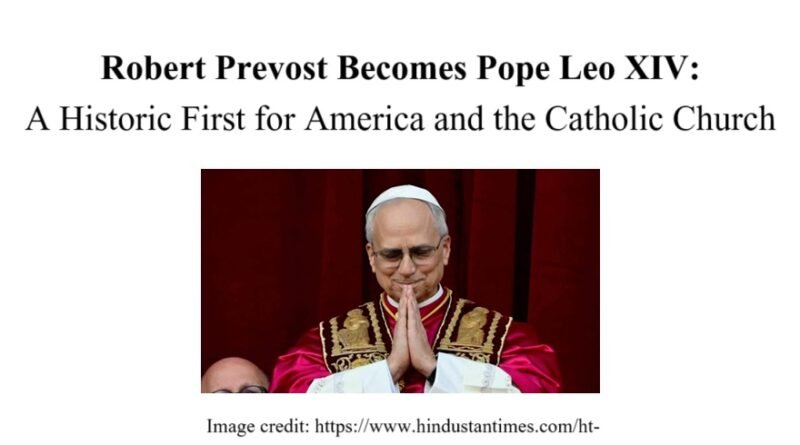Robert Prevost Becomes Pope Leo XIV: A Historic First for America and the Catholic Church
Vatican City, May 8, 2025 — In a moment that will be remembered for generations, Cardinal Robert Francis Prevost, a Chicago-born cleric and long-time missionary in Peru, has been elected the 267th pope of the Roman Catholic Church. He has taken the papal name Leo XIV, becoming the first American-born pontiff in the Church’s two-millennia-long history.
A Groundbreaking Election
Prevost’s election follows the resignation of Pope Francis, who stepped down citing age and health concerns. After days of deliberation in the Sistine Chapel, the white smoke signaled that a new leader had been chosen—and for the first time, the world heard an American name called from the loggia of St. Peter’s Basilica.
While Cardinal Prevost was not seen as a leading contender by Vatican observers, his deep pastoral experience, administrative capabilities, and global appeal appear to have won the confidence of the College of Cardinals.
From Chicago to Chiclayo
Born in 1955 in a working-class neighborhood of Chicago, Robert Prevost joined the Order of St. Augustine early in life. After theological studies in Rome, he devoted over two decades to missionary service in Peru, eventually serving as bishop in the northern city of Chiclayo.
His time in Peru earned him not only dual citizenship but also immense respect from the local population, who referred to him affectionately as “Padre Bob” and hailed his work among the poor and indigenous communities.
Choosing the Name Leo XIV
Upon his election, Prevost chose the name Leo XIV, signaling a desire to continue the social and spiritual legacy of Pope Leo XIII, the 19th-century reformer who championed workers’ rights. His name choice also evokes the simplicity and humility of Brother Leo, a companion of St. Francis of Assisi, reflecting Prevost’s own Franciscan spirit of service.
A Message Rooted in Unity
In his first words as pope, delivered to thousands gathered in St. Peter’s Square, Leo XIV said, “Let us walk together as one people under God’s light—healing, listening, and loving.” His brief yet powerful address emphasized themes of reconciliation, care for the vulnerable, and the importance of building bridges in a divided world.
Global and Local Reactions
Celebrations erupted not just in Rome but across the United States and Peru. In Chicago, churches rang their bells in jubilation. In Peru, thousands gathered in Chiclayo to celebrate the man they consider a spiritual son of the nation. Political leaders, including the U.S. President, hailed the election as a “historic blessing” and “symbol of unity between faith and freedom.”
Church leaders across continents expressed optimism, especially from Africa, Latin America, and Asia, where Prevost has long-standing ties. The Eastern Orthodox Patriarchate welcomed the choice as a step toward renewed interfaith dialogue.
The Road Ahead
Pope Leo XIV inherits a Church at a crossroads. He will be tasked with addressing complex global issues: the clergy abuse crisis, declining faith engagement in the West, rising secularism, and political instability in many parts of the world. He is also expected to bring fresh energy to ongoing Church reforms initiated by his predecessor, Pope Francis.
Yet, many believe that his humble beginnings, missionary heart, and ability to unite people across cultures will define his papacy. With a papal motto reportedly rooted in the words “Servus Pacis”—“Servant of Peace”—Leo XIV is poised to lead with both strength and gentleness.
Image credit: https://www.hindustantimes.com/ht-img/img/2025/05/08/550×309/Robert_Prevost_1746735708327_1746735708684.jpg

